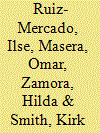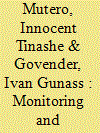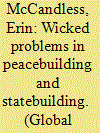|
|
|
Sort Order |
|
|
|
Items / Page
|
|
|
|
|
|
|
| Srl | Item |
| 1 |
ID:
110696


|
|
|
|
|
| Publication |
2011.
|
| Summary/Abstract |
The adoption and sustained use of improved cookstoves are critical performance parameters of the cooking system that must be monitored just like the rest of the stove technical requirements to ensure the sustainability of their benefits. No stove program can achieve its goals unless people initially accept the stoves and continue using them on a long-term basis. When a new stove is brought into a household, commonly a stacking of stoves and fuels takes place with each device being used for the cooking practices where it fits best. Therefore, to better understand the adoption process and assess the impacts of introducing a new stove it is necessary to examine the relative advantages of each device in terms of each of the main cooking practices and available fuels. An emerging generation of sensor-based tools is making possible continuous and objective monitoring of the stove adoption process (from acceptance to sustained use or disadoption), and has enabled its scalability. Such monitoring is also needed for transparent verification in carbon projects and for improved dissemination by strategically targeting the users with the highest adoption potential and the substitution of cooking practices with the highest indoor air pollution or greenhouse gas contributions.
|
|
|
|
|
|
|
|
|
|
|
|
|
|
|
|
| 2 |
ID:
087362


|
|
|
|
|
| Publication |
2008.
|
| Summary/Abstract |
Monitoring and evaluation (M&E) are sensitive issues in relations between donor agencies and recipient governments, especially in a time when the responsibility for implementing aid activities is shifting towards recipients. This paper deplores that, so far, donors and recipients have adopted an overly technocratic approach to M&E, largely disregarding broader institutional and systemic issues. Using case study material from Rwanda, we illustrate that assessments regarding the quality of a country's M&E efforts may differ sharply depending upon one's perspective. At the core of the matter is 'the denial of politics', one of the most serious flaws in the new aid paradigm promoted in the OECD's 2005 'Paris Declaration'. We argue that while a narrowly defined technocratic vision of M&E may seem 'politically neutral', in fact it may jeopardise M&E's functions of 'accountability' and 'feedback'. This can eventually undermine the effective implementation of some of the key principles of the 'new aid approach'.
|
|
|
|
|
|
|
|
|
|
|
|
|
|
|
|
| 3 |
ID:
111072


|
|
|
|
|
| Publication |
2012.
|
| Summary/Abstract |
There is a consensus in the international community that rural electrification and, in particular, the productive use of electricity contributes to poverty alleviation. At the same time, efforts to evaluate the impacts of development projects have increased substantially. This paper provides a hands-on guide for designing evaluation studies regarding the impacts of productive electricity usage. Complementary to the existing literature on evaluation methods, this guide familiarizes project managers with the concrete steps that have to be undertaken to plan and implement an evaluation. The guide comprises three modules based on enterprise surveys and on anecdotal case studies. For each module, the implementation is described on a step-by-step basis including conceptual issues as well as logistics and methodological questions.
|
|
|
|
|
|
|
|
|
|
|
|
|
|
|
|
| 4 |
ID:
182465


|
|
|
|
|
| Summary/Abstract |
The study argues that the value of arts-based interventions in peacebuilding and development is yet to be fully realised due to a paucity of effective monitoring and evaluation models. In a context of growing attention to the benefits of university community engagement to social change, this article reports on how social practice creative placemaking embedded in engaged scholarship can be assessed for efficiency and its effectiveness in giving salience to silenced and ‘unusual’ voices in the pursuit of social justice. We propose an effective monitoring and evaluation model that shows the change development processes and can track and attribute causality.
|
|
|
|
|
|
|
|
|
|
|
|
|
|
|
|
| 5 |
ID:
121427


|
|
|
|
|
| Publication |
2013.
|
| Summary/Abstract |
Peacebuilding and its relatively new partner in international policy discourse and practice-statebuilding-are moving in increasingly larger circles with the recognition that business cannot be done as usual in fragile and conflict-affected states where 1.5 billion of the world's population resides. With rising prominence comes ever greater scrutiny about their nature and means for their practical realization. This article reflects on a question central to this scrutinizing that has befuddled scholars, practitioners, and policymakers alike over the past decade-how should progress out of fragility and conflict, or toward peacebuilding and statebuilding, be measured? Investigating a related question-are we making progress on this profoundly challenging task?-the article considers how international actors are endeavoring to make right on their promise to put national actors at the helm of these projects, which is increasingly assumed to be the primary driver for success in both. Examining these questions in light of scholarship, practice, and a topical policy dialogue case-the International Dialogue on Peacebuilding and Statebuilding-the article argues that, while the process and emerging outputs are messy and challenge established norms of what constitutes good assessment, they are manifesting profound changes in policy and practice, with potentially radical implications for the ways that peacebuilding and statebuilding are measured and aid decisions are undertaken.
|
|
|
|
|
|
|
|
|
|
|
|
|
|
|
|
|
|
|
|
|